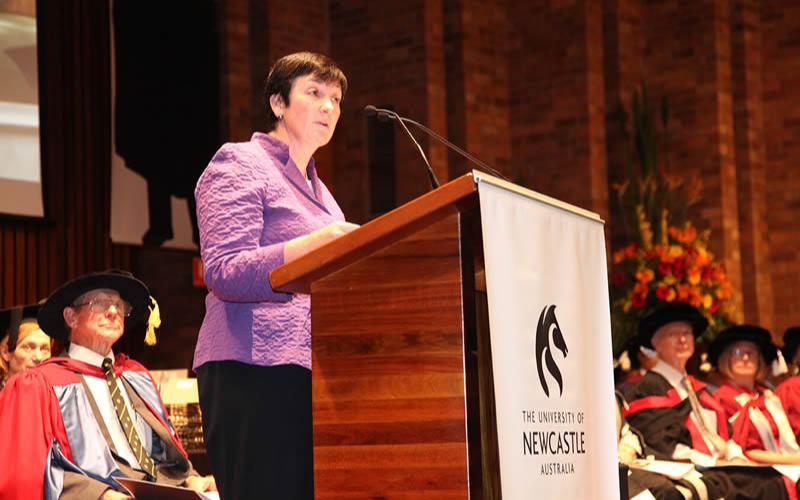The appointment of a lobbyist to lead a Sydney university only emphasises the tightening grip of business on higher education. And as humanities courses are jettisoned and academics laid off work, the salaries of university chiefs have leapt into the stratosphere, writes Michael Sainsbury.
If there was any doubt about the undue influence that the corporate sector has played in the country’s universities it has been put to bed with the appointment of Business Council of Australia chief Jennifer Westacott as Chancellor of Western Sydney University.
Westacott will retain her role at the BCA as well as continuing her nine-year-old board tenure at former coal miner and retailer Wesfarmers. At the BCA she has pushed for lower wages and lower company taxes, and in 2014 celebrated the Abbott government’s repeal of the carbon tax which set Australia back almost a decade on climate change action and helped set up the current energy crisis.
It has been a well-worn path for blue-chip company chief executives and chair people who have been instrumental in the over-corporatisation of universities to the detriment of their academic excellence. They chase high-fee paying overseas students and strip traditional humanities courses in favour of business degrees, laying off tens of thousands of staff and casualising thousands more as well as spending countless millions on consultants.
The appointment of the head of Australia’s peak corporate lobby group to the UWS chancellorship, effectively the institution’s chair, comes only weeks after Australian National University Chancellor Julie Bishop appeared in a video spruiking mining services company MinRes (Mineral Resources Limited). The thoughts of the institution’s Nobel Prize winning Vice-Chancellor Brian Schmidt would be fascinating to know.
Many saw the former foreign minister’s conduct as wildly inappropriate and perhaps a conflict of interest for an institution determined to wean itself off extractive industries, and such inappropriate connections are many among the coterie of chancellors, especially the coterie with serial corporate boardroom duties.
Critical guns trained on Hutchinson
Exhibit A is Sydney University’s long-time Chancellor Belinda Hutchinson’s gig as Australian chair of global arms dealer Thales. This has long been a concern for many students, academics and alumni of the university and she was called out in a searing piece in the student newspaper Honi Soit in September 2021.
“Putting aside the obviously murky ethics of weapons manufacturing in the first place, Thales has a distinctly mediocre moral record. In the last five years alone, it has been the subject of corruption and bribery indictments, been complicit in international humanitarian law violations in Yemen, and is the subject of a complaint to the International Criminal Court”, observed Honi Soit. The journal detailed a lengthy list of Thales misdeeds including involvement in the corruption trial of former South African president Jacob Zuma and kickbacks to disgraced Malaysian PM Najib Razak.
Hutchinson abruptly left the Telstra board in 2007 during the pitched battle between imported CEO Sol Trujillo and the Howard government, offering shareholders no explanation. In her first year as chair, 2013, Hutchinson resigned as the chair of insurer QBE’s board after it posted an unexpected $280 million annual loss, smashing its share price. She maintained that severe weather events that had hit the company were not due to climate change.
A campaign by staff at the RMIT University saw long-time chancellor – and serial board member – Ziggy Switkowski leave due to his position as chair of Crown Resorts. Unions claimed the win although he has denied this was the reason for his exit.
A similar campaign at the University of Newcastle saw incoming chancellor Mark Vaile, former National Party leader, withdraw in June 2021, after a campus-wide outcry about his position as chair of Whitehaven Coal.
Is business taking over university leadership?
Other corporate bigwigs who have taken on chancellorships including Deakin’s John Stanhope, who approved the handing out of expensive watches to Australia Post executives, a scandal that saw the group’s chief executive Christine Holgate sacked while Stanhope kept his job.
University of Technology, Sydney chancellor Catherine Livingstone has held multiple board positions and was chair of the Business Council of Australia during her ongoing tenure. She is chairman of the Commonwealth Bank and on the board of mining services group WorleyParsons.
Some people see the university chancellor’s role as being largely ceremonial but it’s much more. The chancellor sits atop the university’s council or senate that is responsible for the employment of the vice-chancellor, the university’s chief executive. In keeping with corporate practice the salaries of Australian VC’s have leapt into the stratosphere, making them among the world’s highest paid academic managers.
At least 12 vice-chancellors received more than $1 million a year in 2021 as they all cried poor on behalf of their universities due to the pandemic and the collapse in international student numbers. This included a number of institutions outside the top 200 global rankings (only the Australian National University, Melbourne, Sydney, NSW and Monash are in the top 100). The salary of University of South Australia VC, David Lloyd, was $1.2 million in 2020 when his university was ranked a lowly 354. This is almost double that of the salary of Oxford University’s VC Louise Richardson of $637,992 in 2020.
Universities have used their outsized international student revenues – a sector often cited as Australia’s third largest export after iron ore and coal at more than $20 billion before Covid to subsidise research (not teaching) in order to boost their global rankings to attract more international students. A circle with very little virtue.
Vice Chancellor Salaries
| VC Name | University | Annual Profit ($m) | Salary 2021 ($m) | Salary 2020 ($m) |
|---|---|---|---|---|
| Ian Jacobs | UNSW | 306 | 1.52 | 1.44 |
| Duncan Maskell | Melbourne | 147 | 1.51 | 1.51 |
| Margaret Gardner | Monash | 411 | 1.22 | 1.31 |
| Colin Stirling** | Flinders | n/a | 1.23 | 1.23 |
| Deborah Terry | Uni of Qld | 342 | 1.22 | .97 |
| David Lloyd** | Uni of SA | n/a | 1.21 | 1.21 |
| Peter Hoj** | Adelaide | n/a | 1.18 | 1.18 |
| Zlato Skrbis* | ACU | 47 | 1.09 | 1.34 |
** 2020 figure, 2021 Annual Report not yet released
These generously remunerated VCs have been hard at work sacking staff. Nobody quite knows how many have been let go by universities or moved from full time to casual rates.
Big Eight university vice-chancellors, overpaid and under-prepped, cut jobs
University management regimes have also taken a leaf out of the corporate playbook by engaging external consultants including the big four accounting and consultancy firms.
In Victoria, universities are required to deliver a consultants disclosure report as part of their annual reports, giving detailed insight into how much universities are spending on external advice. In 2021 Melbourne University spent $18.3 million on consultants up $5 million from the previous year. Law firms Ashurst, PwC, KMPG and Deloitte took home multimillion-dollar fees.
At Monash University consultants fees jumped from $9.3million in 2020 to $13.1 million in 2021, with Sydney’s Strategic Project Partners and Ernst and Young taking the top two pay cheques. At La Trobe, consulting fees jumped from $8.3 million in 2018 to $13m in 2021.
The top four consulting firms all have dedicated education practices and senior partners dedicated to the higher education sector. Many of their websites are peppered with case studies of their high-fee paying work with universities. Multiply these figures out across the university sector and the bill runs into hundreds of millions of dollars.
The shutting down on thought
There are other results of the corporatisation of universities that will take many areas to wash through the system. One of these is the shutting down of at least 140 academic journals over the past decade. It is estimated that 75% of those discontinued served the arts, social sciences and humanities disciplines, having significant implications for local scholarship.
Journal discontinuation damages research. Scholarly communities and the discourse that develops around a journal might be lost or damaged. The content of journals that are the result of the hard work of researchers – publicly funded work in most cases – is jeopardised.
Hamid R. Jamali, Alireza Abbasi and Simon Wakeling wrote in The Conversation.
All this activity by the universities is boosting their profits, something that many in the sector believe is the very antithesis of what universities should be doing. As the table above shows, many banked profits in the hundreds of millions in 2021 (so much for the pandemic), with Sydney University topping the table with a whopping $1 billion.
Even Australia’s premier conservative magazine Quadrant is in despair about the situation, their literary editor Barry Spurr recently wrote that “Australians, amongst the least intellectually-inclined and engaged of peoples, are mostly uninterested in the ways in which universities are conducted, or the content of their teaching and research. And this, astonishingly, includes alumni themselves. They are very interested in the outcomes of that process: they want highly-skilled doctors, lawyers, vets, economists, teachers and so on, and are mightily dissatisfied (as they increasingly are) if their expectations are not met in those areas.”
As the blurb for academic Salvatore Babones’ recent book, Australia’s Universities: Can They Reform? says:
If universities are the conscience of a nation, Australia needs all the help it can get.
Michael Sainsbury is a former China correspondent who has lived and worked across North, Southeast and South Asia for 11 years. Now based in regional Australia, he has more than 25 years’ experience writing about business, politics and human rights in Australia and the Indo-Pacific. He has worked for News Corp, Fairfax, Nikkei and a range of independent media outlets and has won multiple awards in Australia and Asia for his reporting. He is a fierce believer in the importance of independent media.

